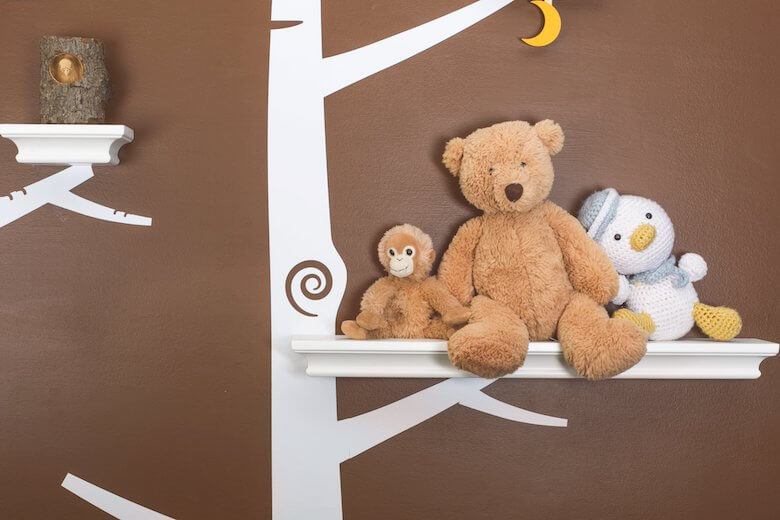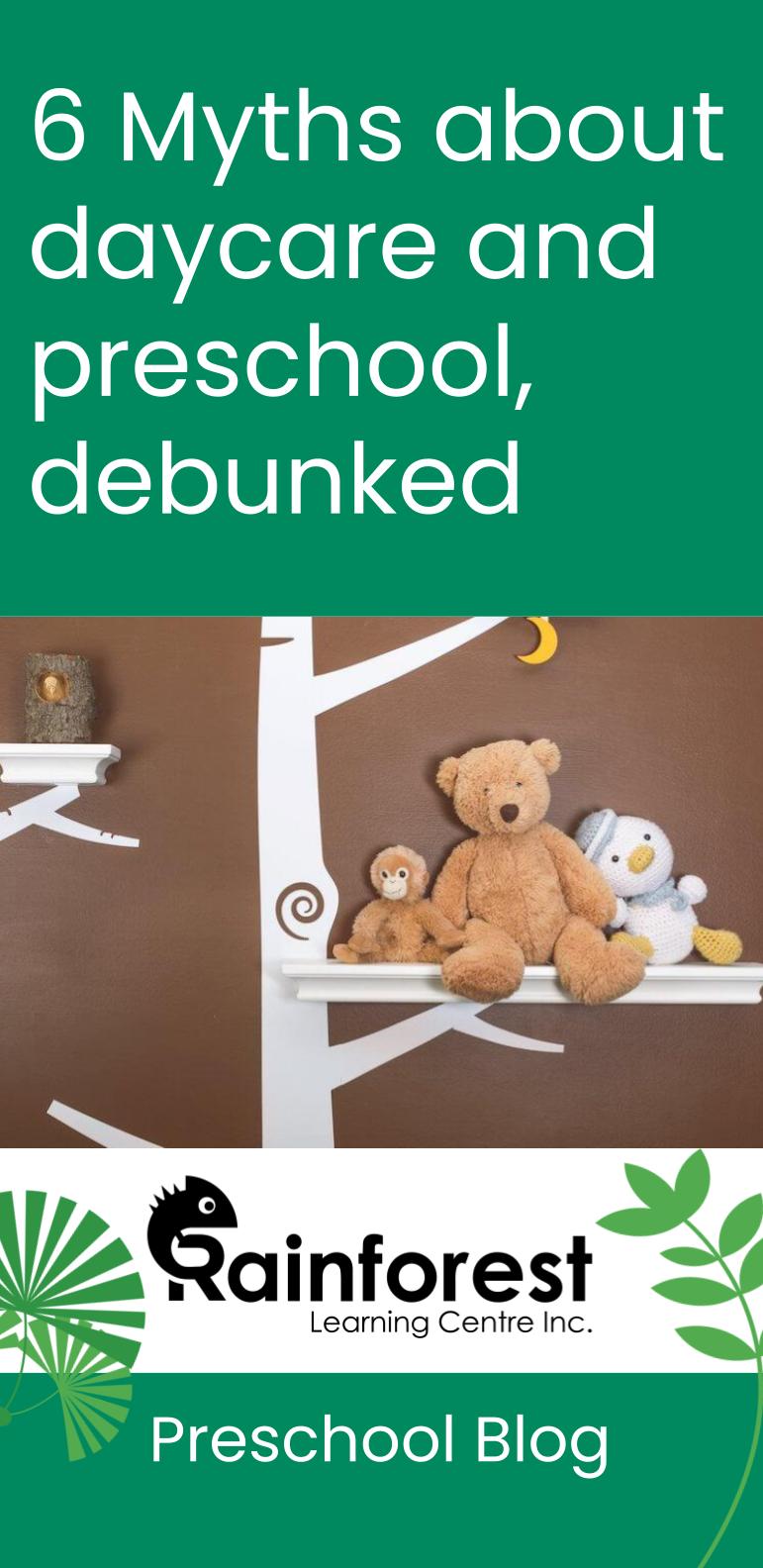
If you’re a new parent, or even if you’ve got more than one child, deciding whether or not to send your child to daycare or preschool can be a challenge. Maybe you feel guilty about going back to work. Or maybe you’re worried your child won’t get the care they need at a childcare center.
While you’re making this decision, it may be helpful to know a few ‘truths’ about common myths that can float around ‘out there’ about daycares and preschools. This list is not exhaustive, but we hope we’ve hit the main ones below. If you have any more questions, feel free to ask us! We’re here to help!
Myth #1) Children need more time at home in the early years of life, they can learn academics later
While this can be a personal preference, we would want to point out that daycares and preschools – at least the modern ones – are not really focused on ‘strict’ academics. The latest theories in early childhood education support the idea of caring for the ‘whole’ child. Educators praise unstructured play, and learning through emergent curriculum methods (even if the entire curriculum is not totally ‘emergent’ per se). They also pay attention to how the child is doing emotionally, socially, cognitively and physically. They try to strengthen the skills the child is interested in, or shows talent in.
Yes, children learn basic academics in some daycares, and more so in preschool programs. But the ‘pressure’ of learning is not quite what it is in grade school. Children in preschool learn mostly through play. They also learn informal lessons, such as how to get along with others, and how to manage emotions. They learn based on their curiosity with teachable moments and outdoor exploration.
All of these types of learning are essential to childhood development. There can be a real difference in a child when they learn the basics of life alongside peers their age, and with someone who specializes in their age group. Children make friends, they laugh together, they marvel at the same things, and they learn to accommodate each other. It’s human.
This is hard to mimic at home, especially if your family is small. A good daycare, really, is a lot like a nurturing home environment, except it’s entirely focused on children. It should support home values, not clash with them.
Myth #2) Daycare is too expensive and family members can watch my child for free, or for less money
We understand that cost can seem like a lot to some families who are considering child care or early learning opportunities. Your own situation will need to be evaluated by you (with no one’s opinion to pressure you!).
If there is the possibility of seeking a quality daycare for your children, and if you are on the fence about it, we would say this:
The value that a child can receive from being in a child-centred learning environment can be immeasurable. It can start them off well in life. It can prepare them for school, teach them independence, how to form relationships, and more.
Recently, the Government of B.C. also began offering child care subsidies. Depending on your income, you may be eligible for financial help through these programs. See the following article on our blog for more information:
If you do plan utilizing family care for your child, the following articles on our blog list useful resources to know about (even if you don’t need them all):
- StrongStart B.C. vs. preschool: which one is right for you?
- Free parenting classes and learning resources for Vancouver-area residents
Myth #3) An in-home nanny can give my children more focused attention than a daycare with lots of kids in it
This may or may not be true. It really depends on your situation, and perhaps the qualifications of the person doing the child care. However, you should know that in British Columbia, even being a nanny is regulated by the government – they may legally be your employee, and you’ll need to arrange a proper tax and benefits system.
Aside from that, there are legalities around how many children can be under the watch of a single caregiver, whether at home, or in a community daycare centre. The laws are designed to not overwhelm an adult with too many children to watch over. This is for your child’s safety, and for the quality of care they receive.
We explain this in more detail, in the following post on our website:
Myth #4) Children get sick at daycare, so it’s safer for them to be at home
This can be true. However, the idea that children should not get sick is false. It is well-known that children need to get sick to build up their immune systems. If you attempt to shelter your child from every cold and flu out there, they may have a harder time with these issues when they go out into the ‘real world’ (whenever that may be). Plus, if your children are on regular vaccine schedules, they should be relatively guarded from many dangerous diseases.
Now, there are exceptions to this rule, of course. If your child is not vaccinated, and is immunocompromised, then we can see how fear of sickness would be a valid reason to avoid daycare.
Also, when major pandemics happen, like the Covid-19 crisis of 2020, society may shut down as a whole. In these cases, a temporary halting of daycare or school attendance would be warranted.
Overall, child care centres should be aware of how bacteria and viruses spread. We can’t speak for other organizations, but we can say that in our daycares, children learn to wash their hands, to clean up, and to avoid each other if they are sick. We also have regular cleaning schedules, to keep surfaces, toys and handles clean.
Myth #5) Daycare and preschool is just child care, and underpaid staff can’t do a good job
Firstly, you should know that in British Columbia, the government mandates specific educational standards for anyone who works in a licensed daycare or preschool. Even the assistants and ‘responsible adults’ must have a certain level of training.
Early childhood education is a specialized field. Preschool teachers (called early childhood educators, or ECEs for short), go to school for years to do their job – some even have bachelors degrees. They learn teaching theories specifically for this age group. They are not ‘just babysitters’ – far from it!
We’ve written about the job of being an early childhood educator on our blog. See the following articles for more information:
Regarding the pay rate of child care staff, this is set by market demand. Since it takes certification to be an early childhood educator, the pay scales are available in advance to those who pursue this as a career (potential students can easily look this up). While we acknowledge that you won’t become rich as a preschool teacher, we hope that those who enter the field are passionate about the difference they are making. It takes a lot to spend years in school studying something you don’t even like doing.
Underperformance is another issue; this is dealt with by the management of a child care organization. If you have complaints about care as a parent, you should definitely bring it up with your daycare provider.
Myth #6) My child could be in danger at preschool while I’m not there to protect them (from bullies, accidents, catastrophes, inappropriate care, etc.)
You’d be surprised how safe licensed daycare and preschools need to be, to maintain their ability to operate. The government checks for safety and cleanliness, and a whole lot more.
Daycares must be earthquake prepared, and they must provide a reasonable amount of space, sunlight and clean air for children. Early childhood educators must have first-aid training. As a whole, the organization needs to set up and comply with injury prevention standards.
There is more to it, but these are the basics. You can learn more at the following links on our website:
- How do professionals evaluate the quality of daycares and preschools?
- What makes a good daycare space design?
- Tips to prepare a daycare or preschool for earthquakes
As for situations that involve inappropriate behaviours (from caregivers or other children), these are rare – at least in quality, licensed centres like ours.
While we can’t speak to how other daycare companies handle behavioural issues, we can say that we take every measure we can to help the victim of a bully, and the bully too (they are in pain, let’s not forget). But if it comes down to it, we will protect our classroom from a perpetual bully by discontinuing services with the family.
Learn more at the following link:
Since we have multiple staff on-site (in accordance with laws), we also have a built-in ‘checks’ for each other. Misbehaviours can be easily spotted and reported to management.
Daycare can be an excellent choice for some families, but it’s not the only choice
To be clear, we are not trying to say that all children should be in daycare or preschool. That is up to the parents. It’s a family decision. However, we do want parents to know the facts. False fears about daycare and preschool don’t need to prevent you from pursuing this option, if it’s the right one for you.
See related article on our blog
- 4 Benefits of before and after school care programs for kids
- 4 Benefits of daycare ‘buddy time,’ when older kids mentor preschoolers
- Attachment parenting and daycare: how does it work?
- What to do when your child doesn’t want to go to daycare
- Should you be concerned about daycare if your baby has stranger anxiety?
- How to know if your child is emotionally ready for school
